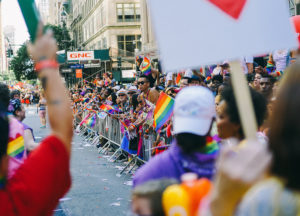How (and How Not) to Attend Pride Events as an Ally

For many folks across the United States, this month is synonymous with a celebration of a hard-fought history draped in rainbows. It’s Pride Month!
Pride is a celebration of existence as resistance, of people refusing to be silenced through fear tactics. It started as a riot against police violence, led by a Black transgender woman named Marsha P. Johnson at the Stonewall Inn in New York’s Greenwich Village on June 28, 1969. Pride is one month out of the year for and by LGBTQ folks. Unfortunately, Pride celebrations have been co-opted by capitalism, by some cisgender-heterosexual (cishet) people seeking excuses for socially acceptable public intoxication, and by the religious right as evidence of moral decay.
In addition to it being the fiftieth anniversary of the Stonewall riots, a lot has happened in the past year that makes Pride incredibly important, including the Trump administration’s attacks on the rights of the LGBTQ community. Visibility still matters, as does centering transgender and Black and Indigenous LGBTQ folks. While public events such as parades are open to all, there are some important steps cishet folks can and should take to show up on purpose as allies.
1. Do your research. Before partaking in any pride activities, make sure you are well acquainted with the history of Pride. Understand the police violence and corruption that led to the riots. Get to know the transgender women of color activists who were repeatedly arrested for their refusal to stay silent.
2. Put your body on the line. Cishet attendees are the some of the greatest resources for keeping hate and violence away from Pride events. See something going down? A religious lunatic yelling slurs? A reveler getting too jostled by the crowds? Put your body between them and step up. Protect LGBTQ people. This is the single most important thing allies can do during Pride and beyond.
3. Pride isn’t about you. Recognize that you are going into these events as a guest and act accordingly. Don’t get exceedingly drunk. Don’t try to draw attention to yourself. Don’t bring offensive signs that you think are funny in an ironic way. And don’t wear a flag unless you are prepared to explain how you are supporting LGBTQ people every day. Instead, offer to take photos for people, cheer on performers, hand out water or snacks, and give up your prime viewing spot to others.
4. Don’t assume. There’s a reason this phrase has become a cliché; because it can and should be applied to how we interact with others on a daily basis. Don’t assume people around you are gay, bisexual, or straight, cisgender or transgender. If you need to know someone’s pronouns, ask. (This is the one educational question allowed and encouraged, see below.)
5. Pride isn’t a spectator event. Historically and today, LGBTQ culture is pushed to the margins of social acceptability, to the detriment of so many. Pride, however, is a moment when people get to be unapologetically themselves. If you show up at Pride events, be aware of that. Gawking or judgement are not okay.
6. The cops aren’t there to be your friends. Don’t thank uniformed cops for showing up and don’t take pictures with them. A lot of LGBTQ people don’t want cops at Pride, and allies should follow the lead of impacted communities.
7. Patronize LGBTQ-owned and -operated businesses. If you are going to partake in the capitalist side of Pride, put your money to work by supporting LGBTQ businesses.
8. This isn’t an educational moment. Don’t ask invasive questions ever, but also not today.
9. Don’t call yourself an ally. Allyship is a lifelong process, not a title bestowed upon you. And it’s not up to cishet people to decide we are allies; calling yourself something doesn’t make it true. Who is your allyship for? Does it actually support LGBTQ rights? Does it lessen violence against LGBTQ people? Are you making sacrifices (to your comfort, to your wallet) to support LGBTQ people?
10. Do the work before and after Pride. Pride comes and goes, but allyship doesn’t. Cishet people all have to do the work every day. Actively support politicians who support LGBTQ communities, be an active bystander on the bus or with your friends and family, and take your lead—year-round—from those most impacted by LGBTQ inequality.
Overall, showing up on purpose to a space that isn’t meant for you requires you to be hyper aware of your own presence and how you interact with others. If that feels uncomfortable, it’s simply because you have the privilege of showing up in spaces meant for you in many other areas of your life. That’s not a bad thing. It’s just a fact. Own it, mull it over, and show up on purpose to support people you love, because today and always, things won’t get better unless we all work to make them better.
